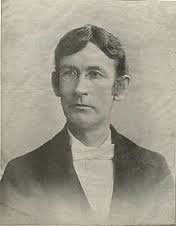Get Today in Masonic History into your Inbox. Sign up today for one of our email lists!
Need an article for your Trestleboard/Newsletter see our Use Policy
Frank Swett Black is Born

Today in Masonic History Frank Swett Black is born in 1853.
Frank Swett Black was an American news paper editor, lawyer and politician.
Black was born near Limington, Maine on March 8th, 1853. He was one of 11 children. At the age of 17, after graduating from Lebanon Academy, he became a school teacher. He earned enough money to go to Dartmouth College, graduating in 1875.
After graduation Black moved to Johnstown, New York. There he began working for Johnstown Journal as a journalist and eventually an editor. Black was a follower of James G. Blaine who was a reformist in the Republican party. Blaine was the leader of a faction called the "Half-breeds", so named by the other major faction in the Republican party at the time. The other faction felt the "Half-breeds" were only half Republican. While the owner of the Johnstown Journal was out of town, Black turned the paper from a Democrat leaning paper to a Republican leaning paper. When the owner returned to town, Black was promptly dismissed.
Black went to Troy, New York next. He got a job at the Troy Whig and then the Troy Times, two local newspapers. While working for those newspapers, Black studied law and eventually was admitted to the bar. He also became involved with local politics. In Rensselaer County, politics had been dominated by the Democrats. Black formed an alliance with independent voters and essentially got himself named the head of the Republican party for the county.
In 1895, Black began serving in the United States House of Representatives. He resigned in 1897 after being elected as the Governor of New York.
Black's term as Governor had it's controversies from the start. After being elected he appointed Louis F. Payn, the man who nominated him as the Republican candidate for Governor. Black appointed him as State Commissioner of Excise, giving him authority over the sale and distribution of alchohol in the state. This angered many throughout the state, including those of his own party. Many pleaded with Black to reconsider, he refused. Payn was viewed by many as a corrupt associate, ironically, of the Republican Party boss, Thomas C. Platt.
Black also came up against Platt. Platt worked out a deal to get a bill passed preventing newspapers from printing political cartoons about the state. Black was very opposed to the bill and it was defeated. This created a rift between them.
Platt, at the 1898 convention, nominated Theodore Roosevelt as the Republican nominee for governor and Black was defeated at the convention. This created a rift between Roosevelt and Black. Despite the rift, Black was asked and eventually convinced to give the nominating speech for Roosevelt at the 1904 Republican National Convention where Roosevelt became the Republican nominee for President. After Roosevelt was elected president, Black became his strongest critic and gave speeches against Roosevelt until 1907 when Black slowly began to fade from public life.
After politics, Black concentrated on his law practice in Troy, New York. He announced in 1912 he was retiring from practicing law.
Black passed away March 22, 1913 from heart disease.
Black was a member of King Solomon's Primitive Lodge No. 91 in Troy, New York.
This article provided by Brother Eric C. Steele.

